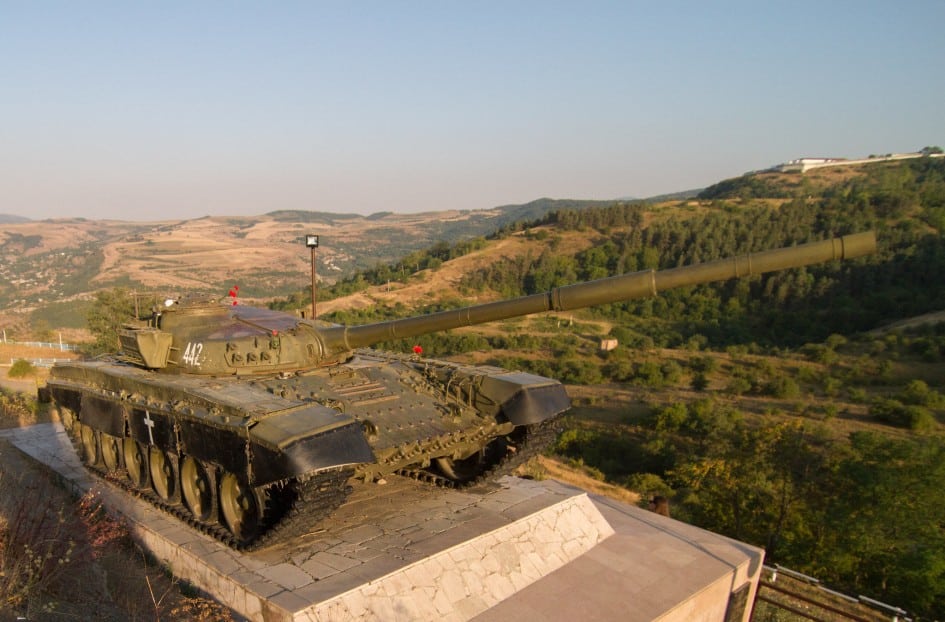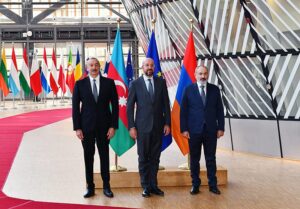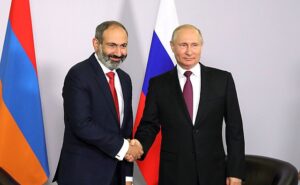Tank memorial in Nagorno-Karabakh, 2017 (source: Flickr)
Armenia has said that at least forty-nine of its soldiers have been killed during new hostilities in its border region with Azerbaijan in the night of 12-13 September. Both Armenia and Azerbaijan blame each other for the escalation – Azerbaijan has also reported an unknown amount of casualties. The clashes are an unprecedented escalation in the already tense Armenian-Azerbaijani relationship since the 2020 Nagorno-Karabakh war as it appears that Azerbaijan has violated Armenian sovereign territories by shelling various villages. Meanwhile, EU and US officials call for ‘de-escalation’, while Russian officials push for a new ceasefire as it attempts to solidify its presence in the region.
An unprecedented escalation
Armenia’s ministry of defense reported various attacks in the southern part of Armenia’s border with Azerbaijan, in the direction of the cities Goris, Sotk, and Jermuk. According to Azerbaijan’s defense ministry, it merely conducted ‘local countermeasures’ after ‘Armenian provocation’.
The clashes are the worst since Armenia and Azerbaijan fought a 2020 war over the contested Nagorno-Karabakh region in which 6,500 people were killed on both sides. Since a ceasefire was negotiated under the auspices of Russia, peacekeepers from the latter country were deployed in the region to maintain the fragile situation. This time, Moscow also said that a ceasefire was agreed after hours of fighting – however this was again violated multiple times after its conclusion.
In the lead-up to the hostilities, Azerbaijan had accused Armenia of failing to implement various parts of the ceasefire agreement towards advancing the EU-US led peace process. During the summer, both countries’ leaders had indicated that a peace deal could be reached this fall. Last night’s escalation could provide a major setback to this process.
EU, US peace process
Both EU and US officials called for de-escalation amid the surge in hostilities. US Secretary of State Anthony Blinken indicated that “as we have long made clear, there can be no military solution to the conflict. We urge an end to any military hostilities immediately.” President of the European Council said, rather softly, that the EU remains “ready to make efforts to prevent further escalation” and there is “no alternative to peace and stability in the region.”
The peace process remains delicate as Armenia demands concessions from Azerbaijan regarding the rights and security of Armenians in the Nagorno-Karabakh region. For Azerbaijan, the use of military means is used to improve its position on the negotiating table regarding these matters. And, next to Azerbaijan, the use of violence on Armenian targets serves the goals of another geopolitical power in the region – Russia.
The role of Russia
During the clashes, Armenian PM Pashinyan immediately asked Russian President Putin for military assistance under the Moscow-oriented Collective Security Treaty Organization (CSTO). Russia is one of Armenia’s rare allies in the region and is worried of US-EU coordinated peace efforts that would undermine Moscow’s importance in the region. It is also remarkable that Azerbaijan only shelled Armenian regions where no Russian peacekeeping forces reside.
Using the threat of conflict, Russia can re-invigorate its so-called peacekeeping efforts, in which it remains of importance in the region vis-à-vis other international powers. Once more, the Kremlin utilizes “divide-and-rule” tactics, in which conflict is utilized to advance certain objectives.
What next?
For Azerbaijan, the benefits of re-igniting the conflict currently exceed its costs. It is military superior over Armenia through advanced weapon systems and UAVs. Furthermore, Baku is geopolitically well-positioned due to the Russian invasion of Ukraine. Russia is heavily dependent of the Russia-Iran corridor through Azerbaijan as sanctions hit its economy hard. It is also military unable to assist Armenia due to its massive struggles in Ukraine.
On the other hand, the EU has turned to Azerbaijan for a lucrative gas deal – which was hailed back in July by EU Commission President von der Leyen as a “trustworthy energy supplier”. It remains to be seen whether this gives Azerbaijan leverage over the EU amid the Brussels-led peace process. For the time to come, it can be expected that Azerbaijan continues provoking and igniting the conflict to use as a means to coerce Armenia to accept unpopular concessions on the Brussels negotiating table. With the US, EU, and Russia not really willing or able to stop Azerbaijan in doing so – Armenia remains situated in highly precarious position.
Sources: Eurasianet NOS Radio Free Europe France24 Ursula von der Leyen, Twitter
Photo: Flickr



